Cover Gallery: Congrats, Graduates!
As you can see from these covers dating back to 1900, America has always celebrated educational milestones with great pride. We’ve always known that our grads would go on to do amazing things!
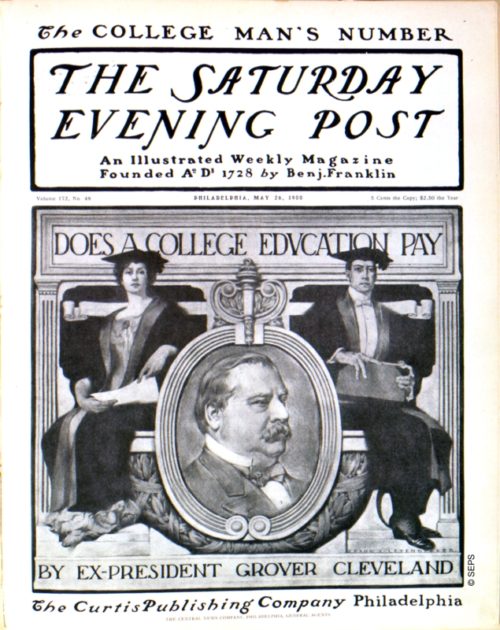
Frank X. Leyendecker
May 26, 1900
This cover of President Cleveland and two college graduates was Frank X. Leyendecker’s first cover for the Saturday Evening Post.
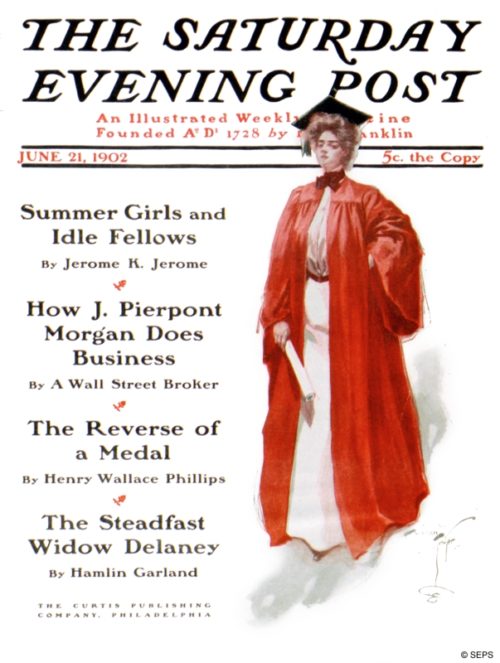
Harrison Fisher
June 21, 1902
The most important work of the early Post period was made up of the elegant paintings of Harrison Fisher. He frequently painted covers that simply presented a lovely woman. Occasionally a prop, like the diploma in this 1902 cover, implied a narrative, but the essential subject remained the woman herself.
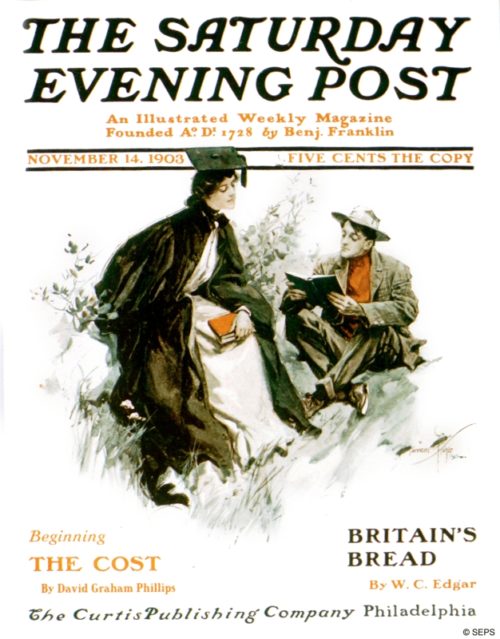
Harrison Fisher
November 14, 1903
This later Harrison Fisher cover shows a couple reading together. Couples doing something romantic was another common theme in Fisher’s covers. Since painting women was his specialty, the woman graduate still remains the focus of this cover.
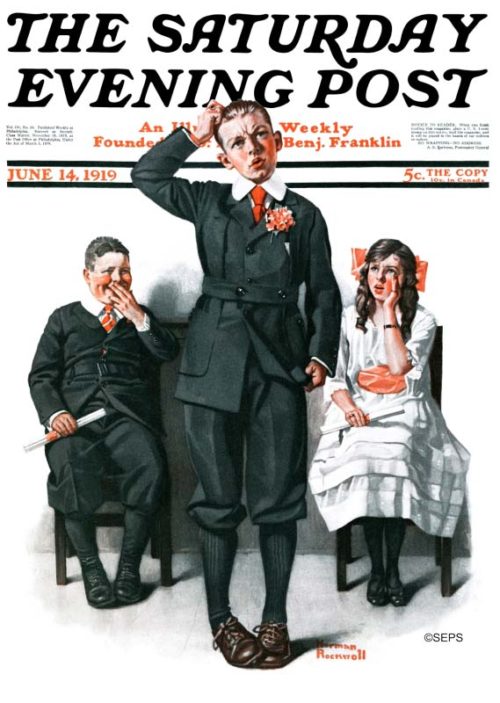
Norman Rockwell
June 14, 1919
This Rockwell cover shows a young student trying to remember his graduation speech. By the look on his face, he doesn’t hear the helpful hints or laughter coming from behind him.
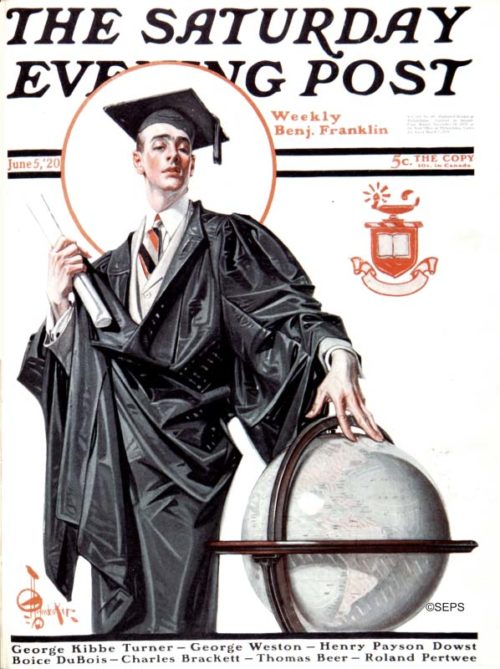
J.C. Leyendecker
June 5, 1920
This J.C. Leyendecker cover shows a college graduate ready to take on the world. Strong male figures were a trademark of many of Leyendecker’s Post covers.
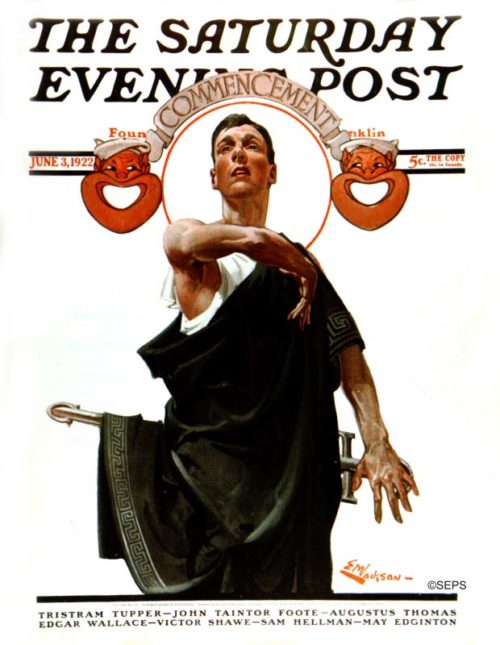
E.M. Jackson
June 3, 1922
This is one of more than 30 covers E.M. Jackson created in the 1920s. While Jackson was mostly known for his paintings of romantic women, he occasionally created a cover focused on a man, like this graduate dressed as a Roman, giving his commencement speech.
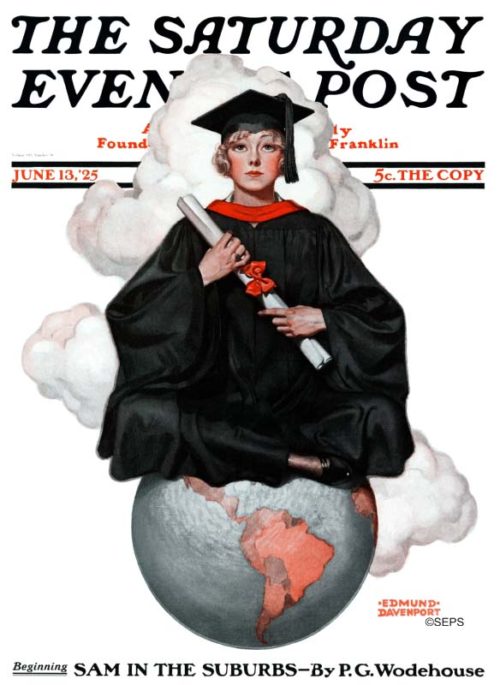
Edmund Davenport
June 13, 1925
This is Edmund Davenport’s third and final cover for the Saturday Evening Post. The clouds behind this graduate make this cover unique and complex compared to Davenport’s other two covers, which have more simple backgrounds.
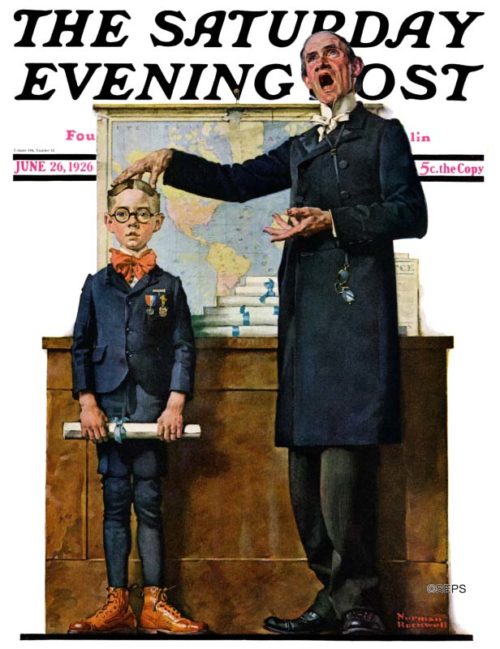
Norman Rockwell
June 26, 1926
In this Rockwell cover a professor hands a young boy his diploma and praises his hard work. It’s assumed that he’s the first in his class based on the large stack of diplomas behind him and the medals on his jacket.
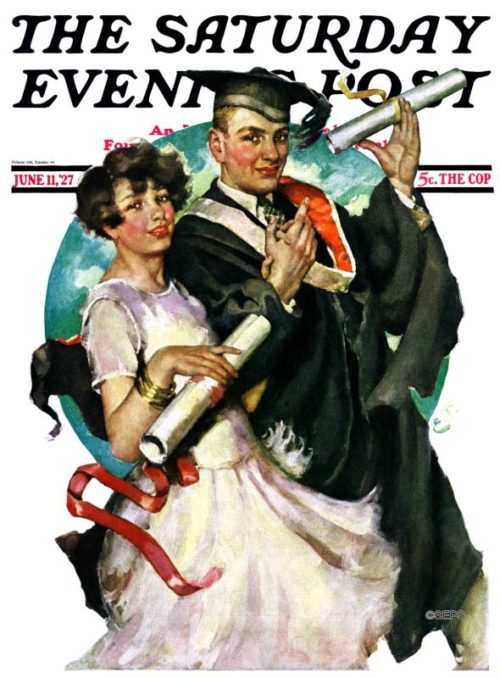
Ellen Pyle
June 11, 1927
This cover was done by one of the Post’s most prolific female artists, Ellen Pyle. Her early Post covers were simple portraits of women. Later on, her work became more detailed and many of her covers have the subject in front of a large, colored circle in the background, just like these graduates on her 1927 cover.
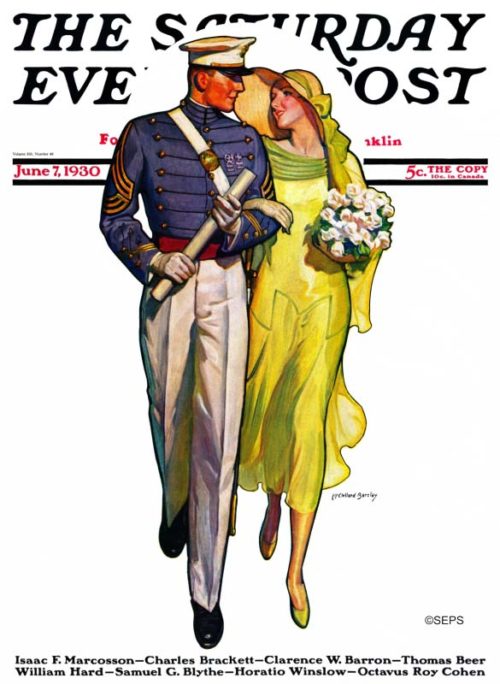
McClelland Barclay
June 7, 1930
This McClelland Barclay cover of a military school graduate and his girl is similar to nearly every other Barclay Post cover. Barclay became well known for his ability to paint strikingly beautiful women in a rather simple setting using bold colors. Barclay painted a total of five Saturday Evening Post covers, and all but one depicts a vibrant couple with an empty background.
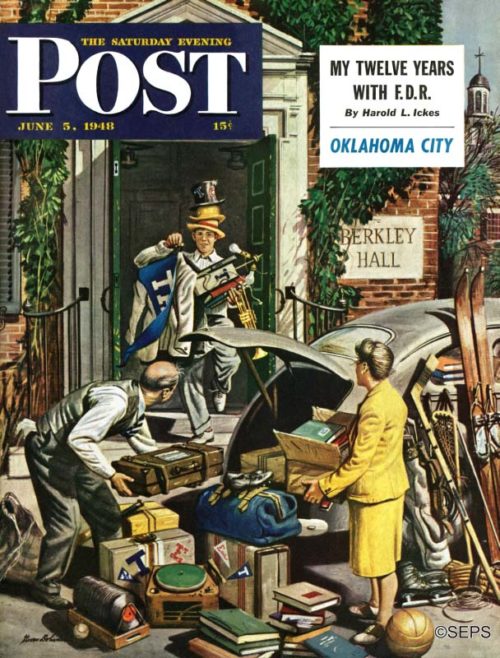
Stevan Dohanos
June 5, 1948
Steve Dohanos’ two sons, Peter and Paul, were in an Eastern boys’ school when he took the family car up to help them move home. A passenger car, he learned, is no proper vehicle for such a job. The artist made his sketches on the Yale campus, but rearranged things to suit his purposes. The boy is George Ritter, of Westport, Connecticut, no Yale man. The artist didn’t use a Yale man, on the remarkable theory that none would like to cut class.
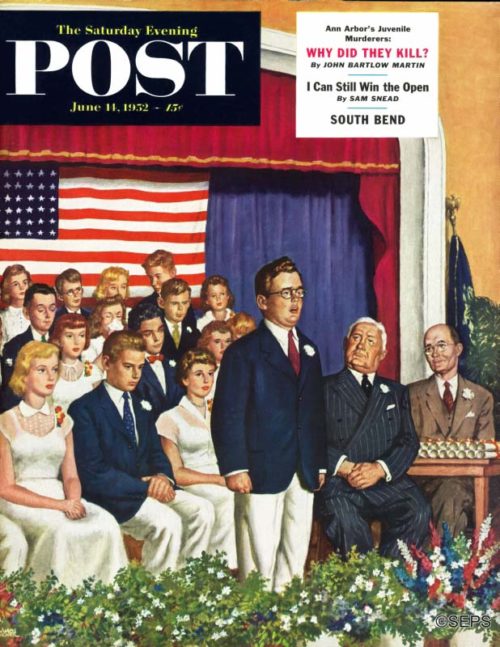
Amos Sewell
June 14, 1952
Once, years ago, a young scholar arose at commencement time to deliver an oration on the Panama Canal, found he had forgotten his entire speech, and started ad-libbing out of the general mass of data he had acquired in the classroom. Everybody vowed it was a grand speech, except his elocution teacher, who nearly had a stroke trying to locate him on her prompting manuscript.
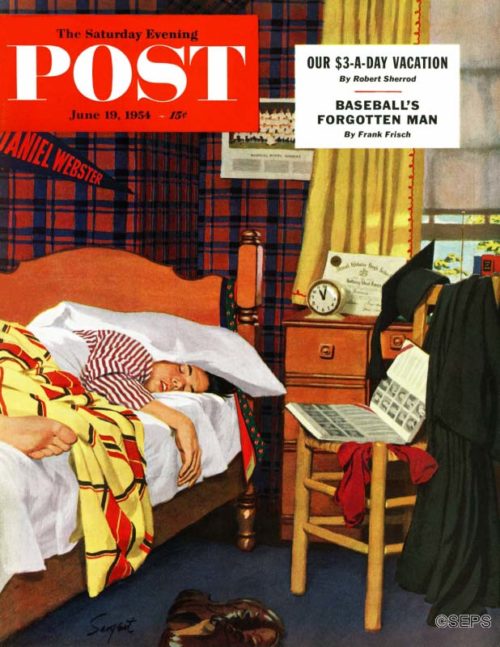
Richard Sargent
June 19, 1954
Now that this young man is going forth from the halls of learning, maybe he is lying there thinking about how his generation soon will he the guardians of civilization, and of what a glorious challenge this is to the youth of today. Or maybe he is asleep. For as Dick Sargent muses with his brush: any guy who manages to finish commencement certainly has forty thousand winks coming.
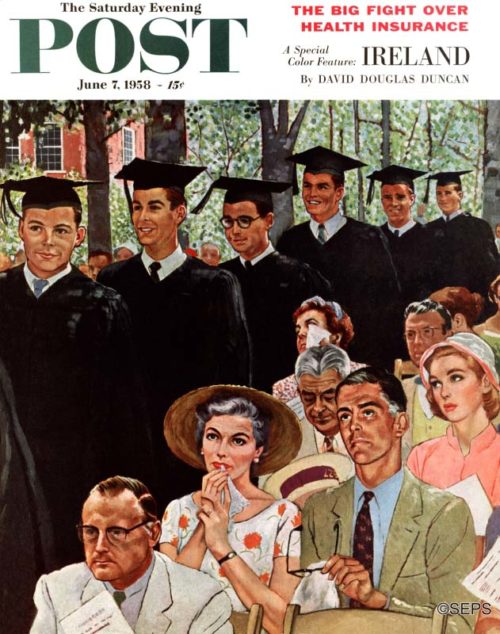
George Hughes
June 7, 1958
Symbolic of a host of graduating Americans, they have an air of quiet confidence, suggesting that as they help mold the future of this cantankerous old world they may be able to make it behave a little better than in the past. Artist George Hughes worked on this cover at Williams College, where everybody did everything possible to make his stay agreeable—well, short of giving him a degree.

Norman Rockwell
June 6, 1959
Artist Norman Rockwell sketched a couple of undaunted graduates (see below); but then, reflecting on the awfulness of today’s newspaper headlines, he created the bewildered chap on the cover. This one is musing. Boy. aren’t things really screwed up? What to do, I wouldn’t know. But one thing you can bet on: I’ll give it the old college try. Rockwell says, “I like his feet. They look as if he’s standing on eggs.”
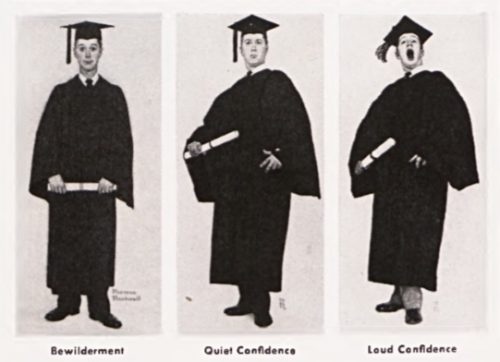
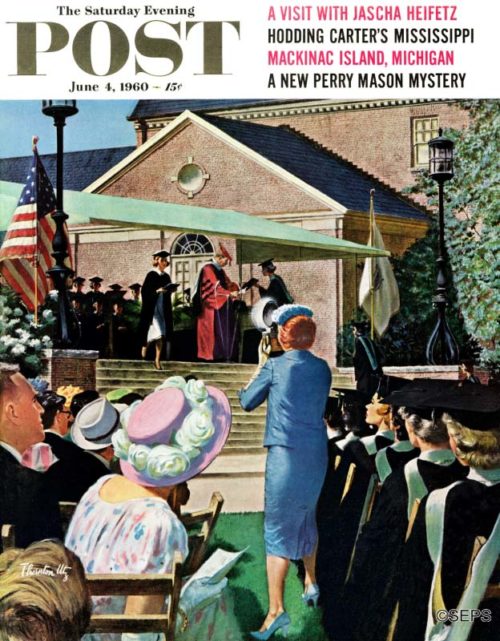
Thornton Utz
June 4, 1960
Artist Thornton Utz’s scene is Smith College, in Northampton, Massachusetts, where in 1960, Congressman Chester Bowles delivered the commencement address. The congressman’s daughter Sarah was among the 500 young ladies receiving bachelor degrees.